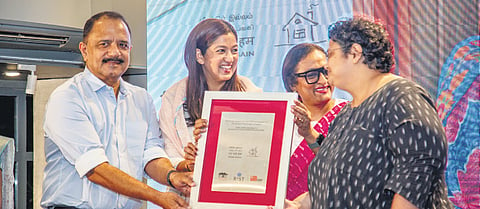

CHENNAI: What if the key to creating an inclusive society lies in addressing mental health, disability, and homelessness together? At The Folly, Amethyst Café on Friday, The Banyan celebrated over 30 years of transformative work and announced an endowment grant from the Rural India Supporting Trust (RIST). This funding will expand its Home Again programme across Tamil Nadu and Kerala, promoting community-based mental health care.
Founded in 1993 by Vandana Gopikumar and Vaishnavi Jayakumar, The Banyan began as a small initiative supporting homeless women with psychosocial disabilities. Over three decades, it has evolved into a globally recognised model of care, with Home Again acknowledged by the WHO and The Lancet Commission for redefining long-term mental health care.
The event highlighted the pressing need to rethink institutional care. Dr KV Kishore Kumar, director of The Banyan, explained that many individuals with mental illnesses face homelessness due to stigma. The Home Again model integrates people into shared homes, fostering dignity and independence in contrast to isolating institutions.
Supriya Sahu, additional chief secretary of Tamil Nadu’s Health and Family Welfare Department, commended this approach for aligning with the state’s progressive health policies. “We need to move beyond asylums and embrace community-driven models that address mental health as a human rights issue,” she said.
Shweta Rawat, managing director of RIST, described the grant as a natural fit for their mission to support healthcare and disability projects. N Ram, director of The Hindu Publishing Group, praised The Banyan’s journey from grassroots activism to a comprehensive mental health model that embodies south India’s ethos of care.
A panel discussed the intersection of mental health, media, and art. Filmmaker Bharatbala highlighted the importance of authentic storytelling in breaking stigma, while Supriya pointed out how films can empower individuals to embrace their identities. Chinki Sinha, editor of Outlook, emphasised the media’s responsibility to amplify marginalised voices and reshape narratives.
MP Kanimozhi Karunanidhi brought both humour and conviction to her address. She began with a light-hearted remark: “Knowing Vandana and The Banyan, even `500 crores wouldn’t be enough!” She praised the Home Again model for restoring dignity and reintegrating individuals into society. “Breaking norms and overcoming fear of change are essential for progress,” she said, urging policymakers to reimagine mental health policies to create inclusive spaces for all.
As The Banyan looks to the future, its journey challenges us to build a society where mental health is no longer invisible. Ram summed it up best: “It’s not just about care but about creating a world where everyone has the right to lead a life of purpose and belonging.”
PERSONAL TRANSFORMATIONS
Stories of those supported by Home Again brought the evening to life:
Amali, now managing ten homes, shared her journey of overcoming community stigma and fostering support for mental health integration.
Sonal, a 34-year-old resident, described rebuilding her life after institutional care. She has since earned a diploma as a beautician and dreams of opening her own salon.
Sheeba, a dancer from Kerala, found stability through art and now inspires others by blending creativity with spirituality.
These deeply personal stories, shared in Tamil, Hindi, and Malayalam, underscored the programme’s transformative impact.